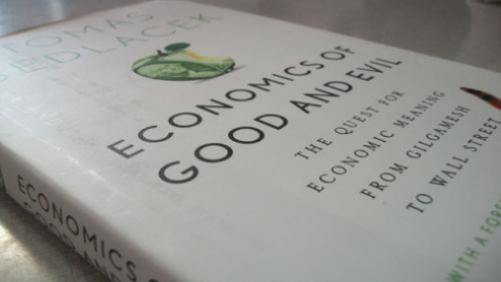Book Review: The Economics of Good and Evil
Sedlacek, T., Economics of Good and Evil, Oxford: OUP, 2011.
Sedlacek’s book Economics of Good and Evil (EGE) marks a fascinating departure from mainstream economic thought and provides the reader with a captivating smorgasbord of interactions across diverse fields such as mathematics, psychology, theology, sociology and physics. Its essence is deeply philosophical and EGE seeks to synthesise a combination of narratives in a holistic manner that many contemporary postmodern readers should find deeply attractive.
Taking the earliest recorded writing, The Epic of Gilgamesh, as its starting point, and traversing a huge array of literature and thought, that economic traditionalists might choke on, he argues that at its core, economics is about wisdom and morality (i.e. emotional and spiritual intelligence), not the rather limited rational scientific game played out in spreadsheets and abstract mathematical calculations, which have evolved from neo-liberal ‘principles’ characterising the last 40 years of global economic ‘development’. Not only has this latter approach been deeply problematic, as the debt crisis of the last 5 years clearly demonstrates, but, as history shows, our recent ‘take’ on economic life has marked a disturbing reductionist departure from human wisdom. This is the case where biblical truths about humanity, and its ills, have been wrongly divorced from daily economic activity.
“From a theological perspective then, EGE is a welcome bridge in bringing ancient wisdoms and contemporary thought back into the key moral debates of our time.”
From a theological perspective then, EGE is a welcome bridge in bringing ancient wisdoms and contemporary thought back into the key moral debates of our time. Chapters 2 and 4 include a comprehensive analysis of biblical perspectives, sandwiching a revisit of Ancient Greek philosophical thought. Treatment of the content in the latter chapter reminds us that many modern conceptions of ‘the market’ and exchange of goods, find their genesis in the classical writings of Xenophon, Plato and Aristotle; it isn’t simply about Adam Smith and Enlightenment thinking only! The real nuggets are unearthed in Sedlacek’s discussion on the ills of our time, including the ‘need’ for economic growth, and the obsession with work, to the exclusion of almost everything else. Behaviour economics has welcome consideration, with discussion on animal spirits and the moral vacuum that contemporary economics appears to prefer and operate within. In essence, as the title suggests, EGE seeks to bring humanity back into economics; this won’t go down well with Wall Street, but is a welcome re-engagement with those of us who are serious, and deeply concerned, about the idols of our time; money as the bottom line by which everything else is defined and has its meaning, being chief of all.
EGE is a tour de force of human development; its trajectory clearly suggests that our ‘progress’ is not as enlightened as we often think. It is a rewarding, if somewhat demanding read; not so much as regards its readability, which is excellent, but it does jump around and is challenging for those not used to reading across so many fields in such an integrated way. I was a little disappointed in the lack of obvious engagement with the ‘green agenda’ and contemporary environmental ethics in dealing with today’s global ecological crises, which, in my view, need to be at the heart of holistic economic engagement today. The book doesn’t promise solutions, but masterfully brings economics back within the human realm where it belongs – oikonomia truly regained! A highly recommended work.
Andy Kingston-Smith, Course Leader MA in Justice, Advocacy and Reconciliation in Intercultural Contexts, Redcliffe College

